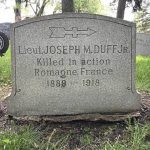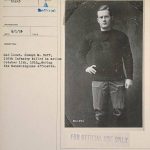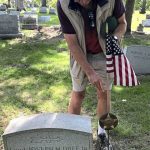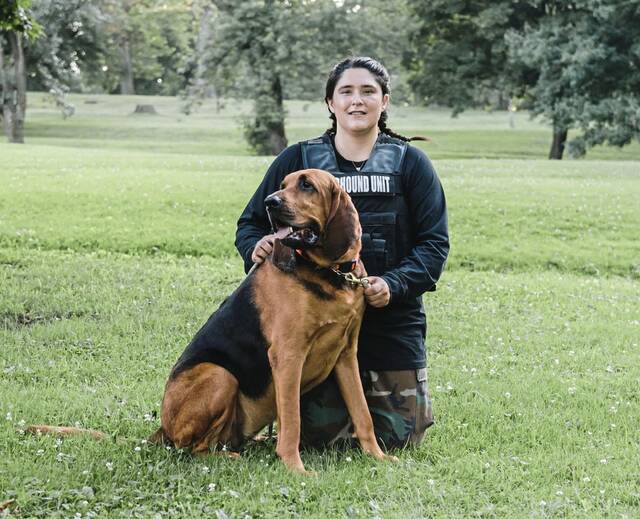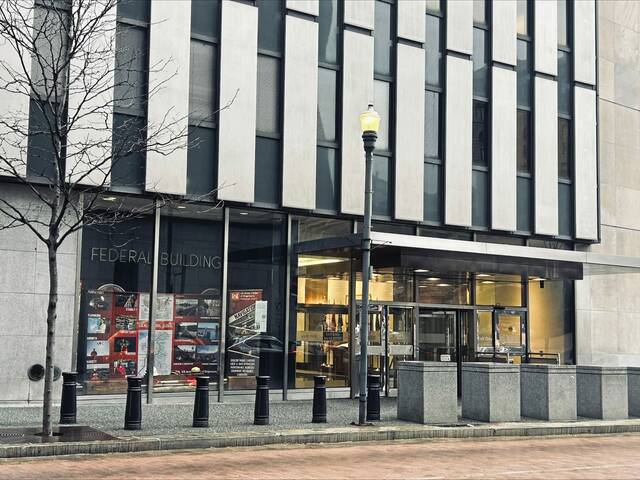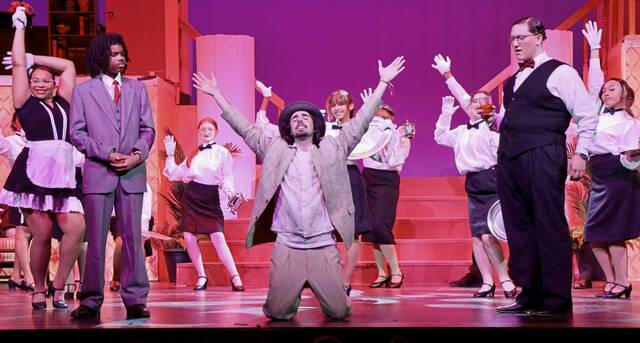A World War I history buff from North Huntingdon shed light on the University of Pittsburgh football coach who quit patrolling the Panthers’ sideline at Forbes Field more than a century ago so he could become a lawyer, only to be killed a month before the Armistice took effect on the 11th hour of the 11th day of the 11th month of 1918.
The little-known short life and tragic death of Carnegie native Joseph M. Duff Jr. is the subject of extensive research by Andrew J. Capets, who went to the battlefield where Duff was killed near Romagne in northeastern France and the nearby cemetery where he initially was buried.
Duff, a U.S. Justice Department attorney who was responsible for catching draft dodgers, or “slackers,” had to fight with his draft board in Carnegie to get into the Army. He had to convince the board that he was suitable for service despite poor eyesight, Capets said.
“How patriotic and determined he was to be part of this fight,” Capets said.
Capets learned about Duff while researching his 2017 book, “Good War, Great Men: The Detailed Accounts of a Machine Gun Battalion During World War I.” The book follows the men of the 313th Machine Gun Battalion of the 80th Division, in which Capets’ grandfather, Andrew A. Capets, served with Duff.
“A lot of these stories have gone mostly forgotten,” Capets said.
With officers being killed, Duff received a battlefield promotion to 2nd lieutenant and was commanding a unit in the 125th Infantry when he was killed on Oct. 10, 1918, Capets said. He was leading a machine gun battalion up a steep ridge in the Battle of Meuse-Argonne, between the Meuse River and Argonne Forest, when he was cut down by German gunfire.
Duff was part of the last Allied offensive of the war and the bloodiest battle for the American Expeditionary Force, which saw about 26,270 Americans killed.
A letter from one of the battalion’s officers mentioned Duff had been hired as a football coach at the University of North Carolina in 1915, Capets said. That prompted more research and revealed the Western Pennsylvania connection, Capets said. The Pittsburg Press reported the same in November 1915, that Duff had been chosen to replace Thomas “Doggie” Trenchard — who briefly coached Pitt in 1897 (then the Western University of Pennsylvania) who also played professional football in Latrobe and Pittsburgh. There was no indication, however, that Duff took the job in North Carolina.
Football star to war hero
Duff, the son of a Presbyterian minister, was a standout athlete at Princeton University. He was named to Walter Camp’s All-American team as a guard in 1911, when Princeton was named national champion. Duff played every position on Princeton’s team except quarterback, according to an April 1913 story in the Pittsburg Press — a time when Pittsburgh had officially been stripped of its “h” — that announced Duff’s hiring at Pitt.
Duff landed the Panthers’ head coaching job in what is a most-unusual manner by today’s standards. The 1914 Owl, which was the Pitt yearbook, says Duff was voted head coach by members of the team at their annual season-ending banquet at the Hotel Schenley in Oakland. In what might have been a nod to who was considered important on the team, a story in the Pittsburg Press mentioned the election of the captains first, before informing readers who would coach the squad.
In coaching Pitt’s football team in 1913 and 1914, Duff compiled a record of 14-3-1, according to E.J. Borghetti, Pitt’s executive associate athletic director. The 1914 season included Pitt’s 96-0 victory over Dickinson, a school record for points scored in a single game, according to Sam Sciullo Jr., a longtime Pitt football historian.
After Duff left the coaching job, Pitt hired famed Carlisle Indian School coach Glenn “Pop” Warner, who coached the famed athlete Jim Thorpe.
“(Warner) took Duff’s players and won the (collegiate) national championship,” Capets said.
As celebrated as Duff was, it is likely he was not the most famous athlete of his day to come out of Carnegie — which also was home to Honus Wagner. The Pittsburgh Pirate shortstop would be one of the first Major League ballplayers to be inducted into the National Baseball Hall of Fame.
Duff is said to have graduated from Pitt’s law school in 1915 and worked for the firm of his older brother, James M. Duff, who would go on to be Pennsylvania’s governor in 1947 and a U.S. senator.
Duff was “an impressive man,” said his great nephew, John van den Heuvel of Stamford, Conn.
“He was a rough and ready guy,” van den Heuvel said of Duff, who once walked from Princeton, N.J., to Pittsburgh — some 340 miles.
The burial in France of Duff and other soldiers killed there set off another battle, this one pitting the families of slain soldiers who wanted their sons brought home and elements of the French and American governments that wanted them to remain on French soil. Capets said Duff’s father, the Rev. Joseph M. Duff, went to the battlefield in France to see where his son had fallen and wanted to have him buried at home.
“His father missed him terribly,” van den Heuvel said.
A McKeesport man organized the Bring Home Soldiers League. Rev. Duff wanted his son’s remains brought home, Capets said, but powerful men, including Gen. John Pershing and former President Theodore Roosevelt, wanted to “let the tree lie where it fell.”
It was not until 1921 that Duff’s remains were brought home.
He is buried in Chartiers Cemetery, where van den Heuvel placed a flag at his grave in September.
“Over 40,000 families wanted them to be brought home,” Capets said.





